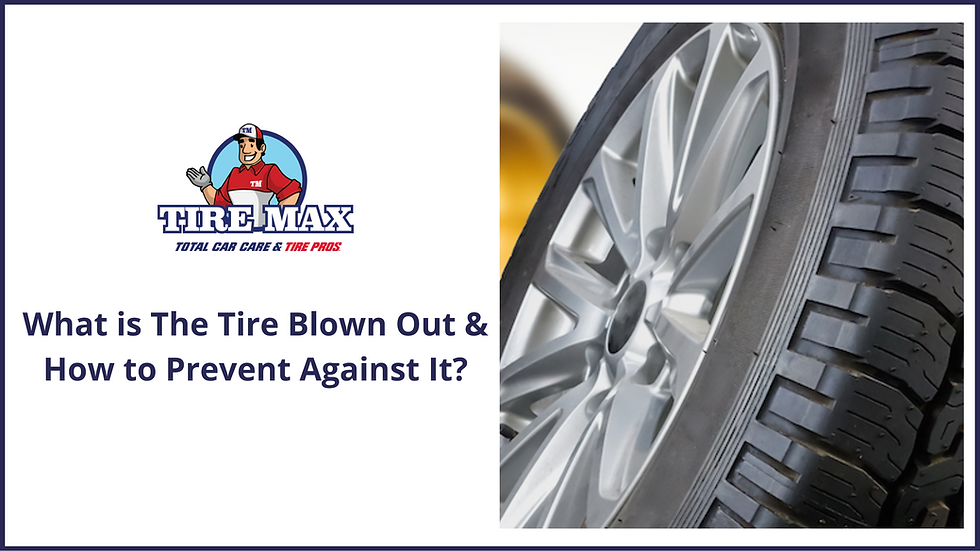What is The Tire Blown Out & How to Prevent Against It?
- Jul 20, 2022
- 3 min read

Tread failures are frightening for both newbies and veterans. You'll hear a loud boom and wonder who or what just hit you. If you're not well-prepared, you may lose complete control of your car and suffer an accident.
Fortunately, there are ways to avoid tread failures. Tire shop experts in High Point, NC, can help ensure that your tires are in good condition and properly inflated. You should also be familiar with the signs of tread wear to take action before it's too late.
In this post, we'll explore what causes tread failures and how to prevent them so that you can stay safe on the road.
What's a Tire Blowout?
Tires can sometimes erupt on the road, making a loud bang and losing pressure. They make a shrill noise and lose air pressure. That is a tire blowout.
Car safety has improved significantly in the last 50 years. With the latest cars, tire blowouts are not very common. But that is no reason to ignore the problem. In 2019 alone, many people died in tire-related accidents, some of which were caused by tire blowouts.
Why Do Tires Blow Out?
Tire blowouts can occur for several reasons.
Too Little Air Pressure in the Tires: Many drivers believe that underinflating their tires will protect them from a tire blowout, but this isn't the case. Underinflated tires are more likely to burst on the road. That's also because low-pressure tires lose their form and are easily overheated.
Overheated Tires: When the temperature of a tire becomes excessively high, strange things do occur. The tire air pressure rises, making a blowout considerably more probable.
Too Much Weight on the Tires: Large cars with heavy loads can stress their tires greatly. Too much weight can damage the edges of a tire and cause small cracks that can quickly become larger and cause a blowout.
Hitting Potholes and Curbs: Hitting a pothole at high speeds can puncture your tire and cause it to blow out. Curbs can also damage tires, so watch where you drive and avoid hitting curbs when possible.
Worn Tires: Worn tires are more likely to blow out because they have less tread. Tread is the grooved rubber outside of a tire that provides traction and helps channel water away from the tire.
What to Do If Your Tire Blows Out on the Road
You could run over a nail or another object and have your tire blow out while driving. It does happen. Understanding what to do if this occurs might save your life.
To begin, remain cool. It's natural to be shocked by the blast, but you must maintain your composure.
Second, don't brake or steer the wheel. Breaking will cause your automobile to spin since you'll only have three working tires.
Instead, hit the accelerator. However, don't drive like an F1 driver; rather, maintain a steady cruising speed. Driving over a tire failure helps you regain control of your vehicle.
Then, after the initial seconds, gradually remove your foot from the gas pedal while applying the brakes softly. Remember to keep the wheel as still as possible. The goal is to reach the side of the road without causing an accident.
Once you are stopped, put on your emergency lights, and call an auto repair shop to have your tire fixed or replaced.
Preventing Tire Blowouts
There are a few measures you can take to avoid a tire blowout:
Make Sure Your Tires are Properly Inflated: When the pressure in a car's gas tank gets too low, the newest vehicle models alert you to this with a bright light on the dashboard. If your vehicle does not have this function, follow the user's guide for the optimum air pressure level. Or take your car to a tire store and ask to check the pressure. They will find and adjust the pressure of your tires.
Don't Overload your Vehicle: Even the most oversized passenger vehicles have weight restrictions. Check with your vehicle's manufacturer to discover their suggestions and follow them.
Keep Your Eyes Far Ahead on the Road: Pay attention to the road and look ahead. This will help you avoid potholes, curbs, and other obstacles that might damage your tires.
Replace Your Tires Before They Are Worn Out: You might think you can get a few extra miles out of your tires before replacing them, but this is not a good idea. Worn tires are more likely to blow out than newer ones, so regular replacement is a good safety precaution.
Read here for reasons to choose brand-name tires for your car.
In Conclusion
Having a tire blowout can be a frightening experience, but there are steps you can take to keep yourself safe. Make sure your tires are properly inflated and not overloaded, maintain control of your vehicle while driving over the blowout, and replace worn tires before they cause an accident. Additionally, remember that driving safely will help prevent future blowouts and keep you safe on the road.
Get in touch with a reputable tire shop in High Point, NC, if you are looking to get a new set of tires.




Comments